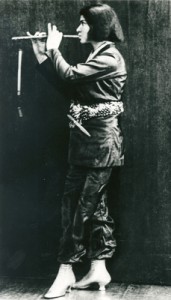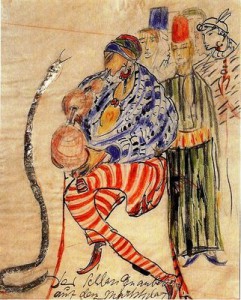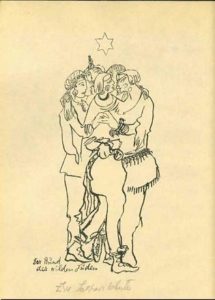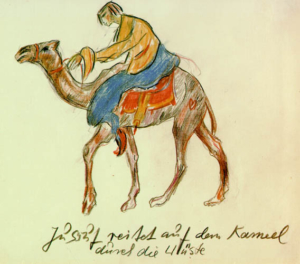If you’re in New York and you go to MoMA anytime soon, you’ll probably run into their exhibit on German Expressionism. If you do, I hope you realize that you’re looking at work by the closest friends of one of the best (and most under-appreciated, in the English speaking world) poets the 20th century produced. Seriously!
I am going to assume that you do not know who she is, so here I will explain: Else Lasker-Schüler was one of the few women in the Expressionist movement in Germany. A popular figure in the café society of Weimer-era Berlin (gosh, but I wish I could travel in time if only to go to those parties) she was both exceedingly smart and exceptionally strange. She had a complicated personal life – married twice, she had at least one passionate, unfulfilled love affair with a fellow poet/an awful person (sorry, Gottfried – but you were), and suffered the early deaths of both her son and her mother. She was also a Jew living in Germany through the years during which Hitler rose to power. Perhaps as a mode of escape, Else was obsessed with masks, costumes, Biblical myths and fairytale lands. She invented a whole other country, Theben (translated into English as “Thebes”), wrote out its detailed history, and dressed herself often as its prince, Jussuf.
Else treated her life like a piece of fiction, always subject to reinterpretation. She would read her poems costumed as various characters (always men) from her invented histories: blurring the lines between gender roles, between her life and her poetry. She could often be found roaming the streets of Berlin, dressed in all the jewelry she owned; she never gave the same year of birth more than once. In all ways and at all times, Else resisted definition. She found power in androgyny, and Ausweg through art.
A toast of the town in the 1920s and ’30s, shortly after winning Weimar Germany’s most prestigious literary prize in 1932 Else was forced, after a violent beating by Nazis, to escape in a night to Switzerland. She eventually made her way to Palestine — which she had ardently hoped would be that promised land described by Zionists — but found it to be harsh and conflict-ridden, and lived out the rest of her life desperately impoverished and almost entirely alone. But still, according to a Ms. Betty Falkenberg, Else remained recognizably herself: “[The poet] Yehuda Amichai has told how he used to see her sometimes in the street when he was a boy in Jerusalem: ‘Her strange figure used to make us laugh…’ She was, he says, “the first hippie I ever saw.’ Others have described her as ‘the first bag lady.'”
The following poem is one of Else’s most famous. It was written in exile, during World War II:
Mein blaues Klavier
Ich habe zu Hause ein blaues Klavier
Und kenne doch keine Note.Es steht im Dunkel der Kellertür,
Seitdem die Welt verrohte.Es speilten Sternenhände vier
— Die Mondfrau sang in Boote —
Nun tanzen die Ratten im Geklirr.Zerbrochen ist die Klaviatür.
Ich beweine die blaue Tote.Ach liebe Engel öffnet mir
— Ich ass vom bitteren Brote —
Mir lebend schon Himmeltür –
Auch wider dem Verbrote.
My blue piano
I have at home a blue piano
But I don’t know a single note.It stands in the darkness before the cellar door,
Since the world became brutal.Four star-hands played it
— The moon-woman sang in boats —
Now the rats dance, clanging.Destroyed are the piano keys.
I mourn the blue, dead woman.Oh, dear angel open me
— I ate from bitter bread —
The gates of heaven already live for me —
Contrary, too, to that which is forbidden.**
In this poem, like many of her darker ones, Else flirts with suicide. But even here, even in one of her direst moments, she still has it: “Es speilten Sternenhände vier/— Die Mondfrau sang in Boote —“. Four hands made of stars, moon-women singing in boats! Oh, Else. I’d travel back in time to Weimar Berlin to go to parties and to be your friend (if you’d have me!).
(p.s. if you’re in Berlin or the vicinity, I hope you stop by the Hamburger Bahnhof to check out their exhibit of Else Lasker-Schüler’s drawings. The show will be up until May 1.)
If you are still reading! Here are some pictures by Else that you might like:
*This is how Gottfried Benn described Else: “Her huge animated raven-black eyes always had an elusive, mysterious look…. it was impossible to go anywhere with her without everyone stopping to stare…. [She] was the Prince of Thebes, Jussuf, Tino of Baghdad, the Black Swan.” AAAAH (Via.)
**Translation (and mistakes) are all my own.
This post may contain affiliate links.












